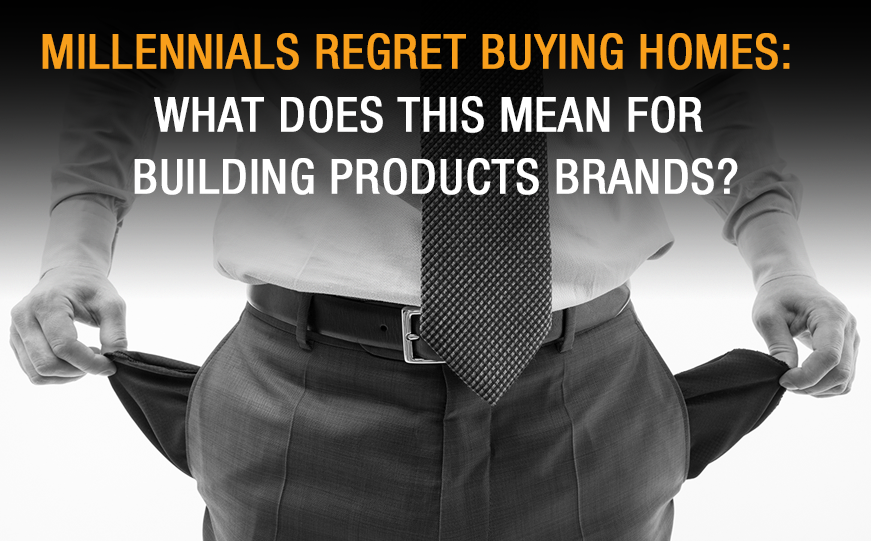The home and building world was rocked recently by a new report that millennials who have purchased homes, to a very large degree, regret that decision. How did this happen? And what can you do about it?
For years, the industry has struggled with mixed signals from this enigmatic generation. At first, it seemed this audience was not interested in the traditional American Dream of buying a home and, instead, would remain renters-by-choice. Yet, as rental rates continued to rise, many brands pinned their collective hopes on the idea that first-time buyers would help propel new single-family construction.
Now, according to a new report from Bankrate, nearly two-thirds of millennial home buyers regret their decision.
Perhaps the hand-wringing over millennials has just reached a new level of absurdity. A closer look may reveal that first-time homebuyers have more in common with previous generations than we thought.
Had this same study been conducted with Generation X a quarter-century ago, the results may have been similar. It’s just that millennials have greater access to technology today – and, as such, are better able to have their voices heard – more than any generation before them.
That doesn’t mean this is an insignificant report. Certainly, it has massive implications for real estate and the building industry. And, as important, architectural and design brands should take note of the report and look for ways they can change their marketing – even their products – to respond to the prevailing attitude that ownership isn’t all it’s cracked up to be.
Losing Patience
At the heart of millennials’ homebuying regrets is the fact that the process of buying a home hasn’t evolved much. Millennials, and to a large degree all other generations, are losing patience with the old way of doing things. They are also favoring brands that offer alternatives.
We’ve seen this evolution gaining significant traction in other industries. Buying cars, booking hotels, hailing taxis, the retail experience, and even in banking… consumers have evolved, and brands that hang onto the old way of selling are being replaced by upstart competitors.
We recommend four surefire methods that can fast-track the improvement of your process:
Educate Consumers
Regret happens when reality doesn’t match expectation. When brands effectively manage buyers’ expectations, that remorse can be delayed – or ideally – averted.
Almost every first-time homebuyer goes into the process incredibly naïve. There are surprisingly few resources available that provide frank, honest information about what owning a home really entails. The pros and cons. The joys and frustrations.
What if your brand helped to provide some of those resources? Even if the information is only tangentially related to the products you sell – and even if consumers postpone the purchase decision because of your guidance – your honesty and candor will be rewarded over time.
Maintenance Resistance
One of the key complaints millennials have about home ownership is the required ongoing maintenance. They didn’t understand going in how big (and expensive) maintaining a home would be.
Today’s construction products are more resilient, long-lasting and maintenance-free (or at least maintenance-minimal) than ever before. Yet, few building products manufacturers have accomplished much brand equity with this promise.
The more you can promote the low cost and ease of maintenance of your products, the more likely you are to engender satisfied home ownership.
The Long Tail
To a growing extent, we are living in a subscription-based economy. More products than ever before – especially those that need to be replaced periodically – are provided through subscription services.
The best examples of this model are, of course, consumer packaged goods brands like Blue Apron and Dollar Shave Club. Yet companies such as FilterEasy have extended this convenience into a value-add for residential air filters.
How can your product or service help home and building owners increase the pleasure of decorating, maintenance, repair and even remodeling?
Build In Social Value
It’s well-documented that millennials are more socially conscious than any generation that preceded them. And Generation Z, which is coming up on their heels, may be even more so.
Traditional homeownership in the past required acceptance of certain compromises, at least in the eyes of some, when it came to social and environmental issues. Building product brands – for that matter even builders and developers themselves – would do well to recognize and address this new and growing opportunity.
For starters, it means offering socially and environmentally conscious products – brands that are sustainable, energy-efficient and recyclable. With eco-friendly packaging. Even company operations will continue to be subject to growing scrutiny as emerging buyers opt for products from companies that exemplify diversity, philanthropy and equitable employment practices.
But it goes beyond the products, to the homes and even neighborhoods themselves. Builders should take note of modern sensibilities when it comes to green space, access to public transportation and walkability, for example.
If there’s one thing consumers will pay extra for – and this goes double for millennials – it’s trust and convenience. When owners feel good about the homes they’re buying and when the building products within those homes contribute to a lifestyle they believe in, they’re far less likely to have regrets. This will result in significantly more loyalty and long-term equity for you.




